
Interconnectedness, Systemic Crises and Recessions
This relatively simple model attempts to capture and integrate four widely held views aboutfinancial crises. [1] Interconnectedness among financial institutions (banks) can play a majorrole in precipitating systemic financial crises. [2] Lack of information about the quality of bankportfolios also plays a role in precipitating systemic crises. [3] Financial crises, particularlysystemic ones, are often followed by severe, lengthy recessions. [4] Loss of confidence in thefinancial system is partly responsible for the length and severity of these recessions. In themodel, banks make decisions about initiating and liquidating risky loans. Interconnectednessamong their asset portfolios can obscure information about these portfolios, causing them tomake inefficient decisions about liquidation, and about retention of the managers who assesscredit risk. These decisions can increase the depth of recessions, and they can produce systemicfinancial crises. They can also reduce the effectiveness of future bank risk assessment,increasing the probability of lengthy, severe recessions. The government, acting in the interestof current and future depositors, may wish to increase the transparency of bank portfolios bylimiting interconnectedness. The optimal degree of regulation, which may depend ondepositors' degree of risk aversion, may not eliminate financial crises.
Publication date: February 2015
ISBN: 9781498386029
$18.00
Add to Cart by clicking price of the language and format you'd like to purchase
Available Languages and Formats
| English |
Prices in red indicate formats that are not yet available but are forthcoming.
Topics covered in this book
This title contains information about the following subjects.
Click on a subject if you would like to see other titles with the same subjects.
Economics- Macroeconomics , Economics / General , International - Economics , financial crisis , systemic risk , interconnectedness , recession
Summary
Copyright © 2010 - 2024
Powered by:
AIDC



